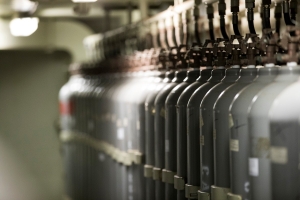


(Posted on 27/09/20)
Global safety leader Survitec is advising the maritime industry to ensure fixed fire-fighting systems are commissioned by their original equipment manufacturers and that crews undergo basic system configuration training, following a spate of incidents where ship fires have been exacerbated through incorrect use or installation of CO2-based extinguishing systems.
While the International Maritime Organization’s FSS Code provides engineering and design standards for all types of fire extinguishing systems, there are no mandatory regulations governing their installation and commissioning, only recommendations. Standards on operation and maintenance have improved over the last years but in many cases, they are still seen as guidelines
Survitec said that although these guidelines should be followed, there have been several incidents in recent times where fixed fire extinguishing systems have failed.
“While it is difficult to put a number on all the fire related incidents where incorrect installation, operation or maintenance of a fixed firefighting system has resulted in system failure, injury or death, the subsequent accident investigations offer a difference perspective on the effectiveness of the current regulations and guidelines,” said Mats Hestmann, Survitec Group QHSE Manager.
“Fire safety systems are inherently designed to protect and save lives. However, if these systems are incorrectly used, installed or insufficiently inspected and maintained, the consequences can be severe,” said Hestmann.
MSC.1/CIRC 1318, the Guidelines for the Maintenance and Inspections of Fixed Carbon Dioxide Fire-Extinguishing systems was released in June 2009 and have been adopted by most Flag states, but some are still following their own set of standards.
Hestmann, believes that it would be beneficial for MSC.1/CIRC 1318 to become even more structured as is the case with MSC 1432, clearly defining what should be inspected. Once the majority of flag states have adopted an MSC circular, it then becomes a resolution making it mandatory.
He adds: “Great improvements to safety have come as a result of IACS Z-17 Service provider approvals. However, it’s not the failure of the firefighting system that is resulting in so many incidents, but rather the lack of system knowledge and poor operator training. There should be more effective rules governing system training; because a crew member is familiar with one firefighting system doesn’t mean they are appropriately trained to use another manufacturer’s system or even a different system configuration. While the product itself might be standard, the layout of the system, the location of valves, cylinders, and vents and so on will differ from ship to ship. Certainly, crews need to be better trained in the use, operation and maintenance of these systems.”
Columbia Group anticipates a period of strong expansion as an increasing number of international shipowners... Read more
Norse?Ship Management has expanded its use of Smart Ship Hub’s high frequency sensor data and... Read more
As the maritime industry gears up to welcome the IMO’s STCW bullying and harassment training amendments... Read more
NORDEN has acquired the cargo activities of Taylor Maritime in Southern Africa (previously operated... Read more
Philippos Ioulianou, Managing Director of EmissionLink, has warned the IMO’s decision to delay... Read more
VIKAND has highlighted the need for cultural change in the maritime sector as reports of bullying, harassment... Read more
The maritime industry is experiencing a period of significant transformation, driven by rapidly evolving... Read more
NorthStandard has advised Members of a 5% increase in P&I premiums for the marine insurance year... Read more
Anemoi Marine Technologies, the UK-based leading designer of Rotor Sails for wind-assisted ship propulsion... Read more
Helm Operations has announced that nine electronic record books within Helm CONNECT Logbook have been... Read more